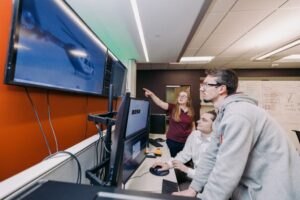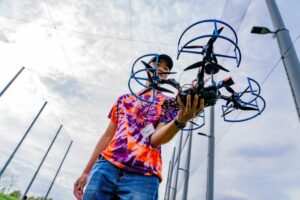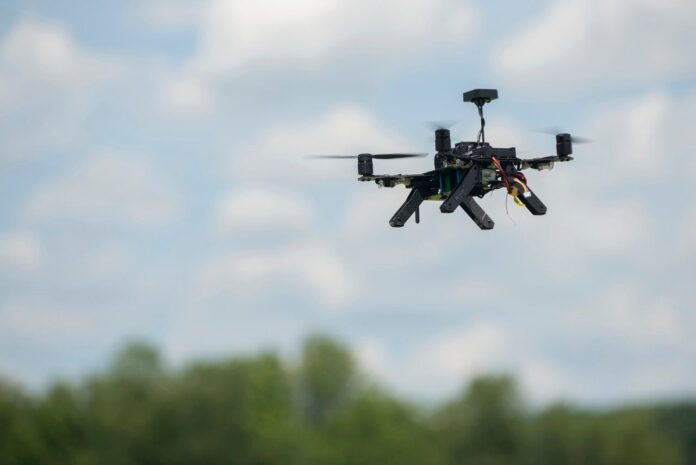A new Virginia Tech effort will take aim at bolstering the nation’s defenses against uncrewed aerial systems (UAS), commonly called drones.
A recent $5 million award from the U.S. Army Futures Command Combat Capabilities Development Command C5ISR Center will augment capabilities at the existing Counter UAS Research and Testing Center that will include an unparalleled ecosystem of drone research with outdoor, indoor, and virtual labs working in tandem. Led by the Virginia Tech National Security Institute and the Virginia Tech Mid-Atlantic Aviation Partnership (MAAP), these efforts will leverage the long-standing expertise of both organizations to help the Department of Defense and law enforcement mitigate threats from both novice drone users and nefarious actors.
“MAAP has experience conducting research around the domestic threat, whereas the National Security Institute has expertise in adversarial nation threats,” said Austin Phoenix, director of the institute’s Mission Systems Division. “Bringing together MAAP’s ability to do dynamic, high-volume drone testing work within Federal Aviation Administration regulations and our expertise in security research, artificial intelligence, radio frequency systems, and system modeling will allow us to really push the bounds of the country’s UAS and counter-UAS capabilities.”
The center, which is expected to officially launch in the coming year, comes at a time of increased drone use, both domestically and abroad. In December of last year, there were drone sightings along the East Coast that raised concerns for many, while drones have also become weaponized for use in international conflicts.
“This research is going to immediately contribute to the Department of Defense’s efforts to keep people and critical infrastructure safe,” said Tombo Jones, director of MAAP. “Long term, we’re also building a foundation for future research that will benefit any agency – federal, state, or local – that has an interest in protecting resources and assets from a variety of UAS threats.”
MAAP is a part of Virginia Tech’s Institute for Critical Technology and Applied Science.
The new center will have three components.
- An outdoor test bed will employ a high number of sensors to collect detailed data, allowing for a comprehensive understanding of effectiveness of systems designed to detect, identify, and defeat drones. “A lot of UAS use Bluetooth or Wi-Fi frequencies to communicate, so counter-UAS systems are often trying to find a drone in an environment flooded with technologies using these same frequencies,” Jones said. The capability will enable evaluation of UAS systems to operate safely and detect unknown UAS in congested environments.
- An indoor facility will allow researchers to block out external signals in order to enable the collecting of UAS signatures and testing commercial counter-UAS systems in a controlled environment.
- A virtual environment will allow researchers to build and test autonomy, develop digital representations of the indoor and outdoor test facilities, and generate environments that we can replicate in our outdoor and indoor facilities to expose UAS and commercial counter-UAS systems to more relevant conditions.
“We’ll be able to recreate these virtual environments in the outdoor test environment by generating signals that look like cars, Bluetooth devices, and other challenging aspects we would expect in an urban environment,” Phoenix said.

Along with the benefits of the research itself, the center will also be supporting the development of a future workforce. About 20 Virginia Tech students from the National Security Institute are currently involved in the creation of the virtual environment, while three students from MAAP are expected to assist with the outdoor test bed.
The researchers believe that together, the people and the technology will play a critical role in advancing counter-UAS for numerous current and future applications.
“Historically, we’ve used expensive things to shoot down expensive things, but now, we’re having to use very expensive missiles to defend against very cheap UAS, so there’s a huge cost imbalance needing to be addressed,” Phoenix said. “It’s a huge challenge and I’m really excited to see this highly valuable test site develop to where both Virginia Tech and partners outside the university can come to validate, verify, and demonstrate their own technologies to meet that need” using lower cost non-kinetic defeat technologies, along with emerging drone on drone defeat capabilities.

– U.S. Sen. Mark Warner
– U.S. Sen. Tim Kaine
“The research and development of uncrewed aircraft systems and counter-UAS technologies at Virginia Tech’s National Security Institute and Mid-Atlantic Aviation Partnership are critical to our national security. I’ve been proud to support Tech’s research partnership with the Department of Defense, and as a member of the Senate Armed Services Committee, I look forward to continuing to work together to advance our own UAS capabilities and counter those of our adversaries.”
– U.S. Rep. Rob Wittman
“As vice chairman of the House Armed Services Committee, I am committed to the United States’ leadership in UAS and counter-UAS technologies, given the role of drones in modern defense. As a Virginia Tech alumnus myself, I particularly appreciate Virginia Tech’s efforts to support the Department of Defense’s UAS priorities and help ensure we are prepared to respond to threats at home and abroad.”
– U.S. Rep. Morgan Griffith
“Virginia Tech is home to some of the top national security and UAS researchers in the country. It’s a natural fit for the university to lead the Counter UAS Research and Testing Center, as the U.S. works to stay ahead of the rapidly evolving UAS environment.”
By Travis Williams


